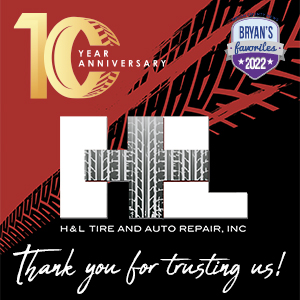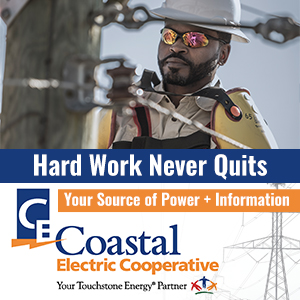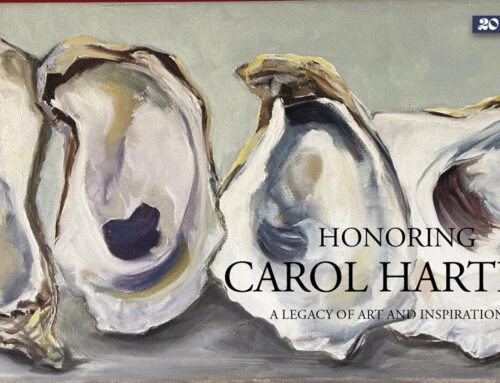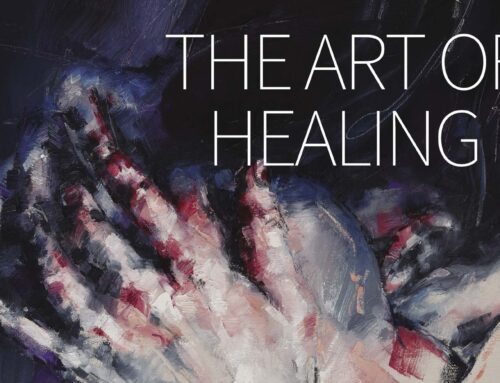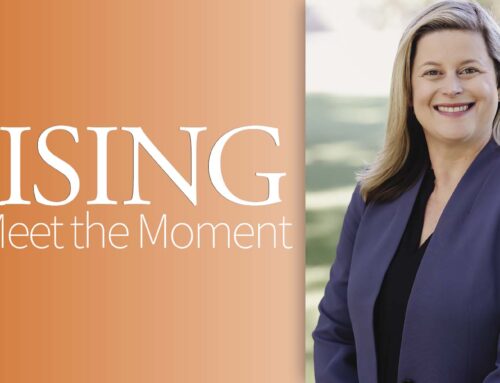
Learning How to Sleep Again
A conversation with Richmond Hill’s newest success story – Buck Holly
WORDS BY BEN MERRILL PHOTOS BY PAIGE GLAZER
SPRING 2022
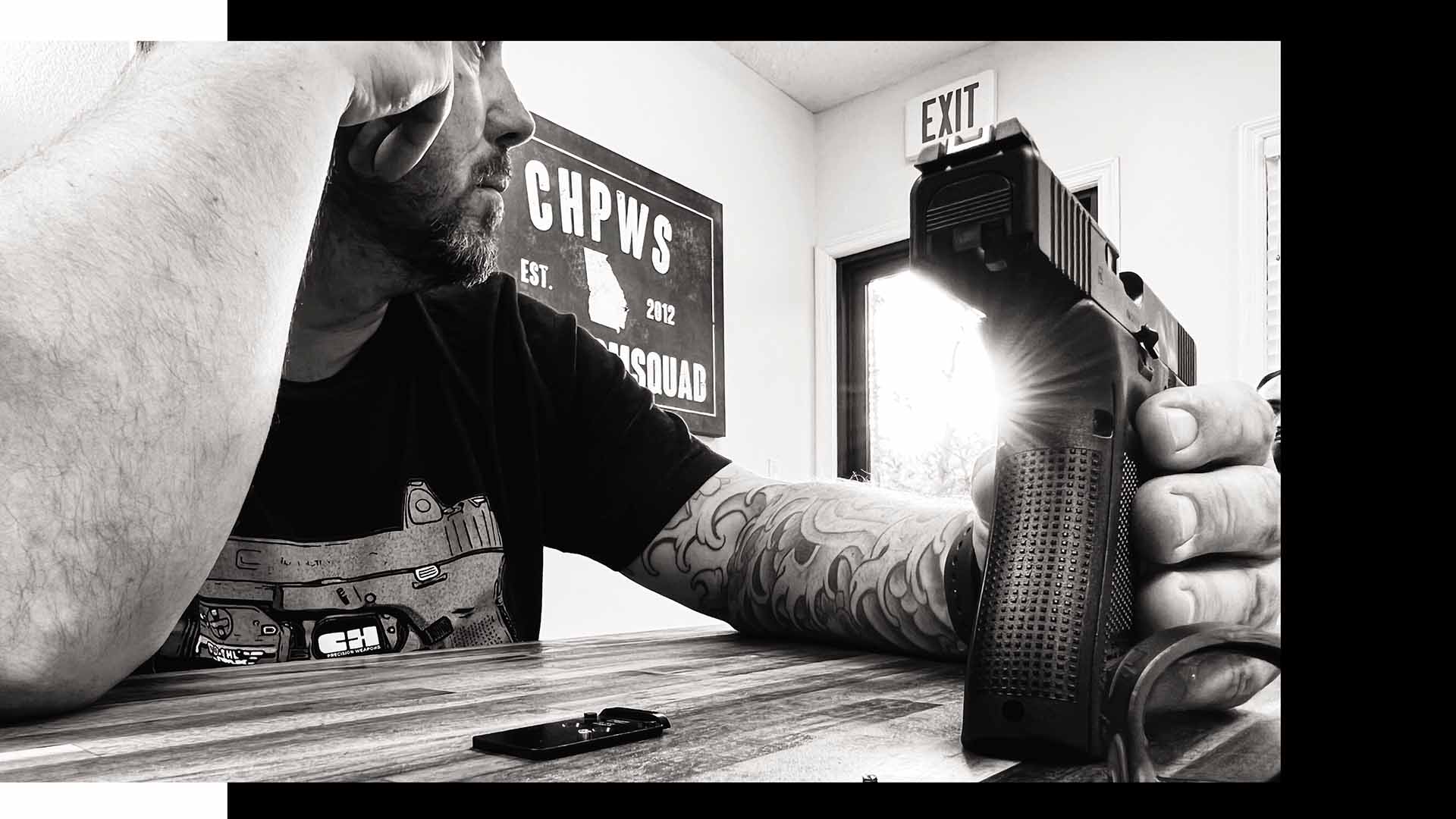
“Go confidently in the direction of your dreams. Live the life you’ve imagined”
— Henry David Thoreau
Just over a year ago, Buck Holly moved into his spacious new home on the banks of the Great Ogeechee River. After years of living in much smaller quarters – we’ll get to that in a minute – Buck finally had a little room to stretch out. His new bedroom, with a commanding view of the river and marshlands beyond, was nearly twice the size of his former home. There was only one problem.
“I couldn’t sleep,” he says. “When I first moved in here, I wandered around this house all night trying to figure out what was wrong. Then it hit me. It was too quiet. I could hear crickets and owls. I could hear the breeze in the live oaks. I swear, I could even hear the river. What I couldn’t hear were machines humming and grinding away – a sound I had gotten used to over the four years I lived in the back corner of my workshop.”
Buck Holly arrived in Richmond Hill about five years ago with his wife and young daughter. After years of working in the munitions industry and traveling around the world, sometimes for as many as 300 days a year, he was ready to stay closer to home. Ready to be a dad. Ready to build a family life.

“We were living in southwest Florida,” he says, “but my wife was a Georgia girl, and she was ready to come home. So we looked around a bit, and we found this nice little community called Richmond Hill. We knew it had good schools and our daughter was about to start kindergarten, so without a whole lot of thought, we packed up and came here. I was fairly well known in the gun industry by then, and moving my business to Georgia wasn’t a problem. So I looked around for some commercial space and I had the good fortune to meet Charlie Burkett. Things were tight, and after a little negotiation, Charlie offered to lease me some space out on Edsel Drive at a significant discount. I was starting to feel good. Things were looking up and I was excited about this new phase of my life.”
But then, almost immediately, things took a turn for the worse.
“First it was hurricane Irma,” Buck says, leaning back in his chair and trying to remember the exact sequence of events that set him on the journey that he says is just now starting to take shape. “That was in September, 2017. We’d been here for about a month. Then, in October, my wife made the decision to go in a different direction. So we separated. She stayed in the townhouse with our daughter, and, with no money and nowhere else to go, I moved into the back of my shop. So here I was – brand new in town, suddenly single, just set up my business, didn’t know anyone, broke, and sleeping in my shop. Little did I know I’d be sleeping there for the next four years. And all I kept thinking was: ‘Good Lord, I’m stuck here in Richmond Hill, Georgia.’”
If you know Buck Holly, you know that getting “stuck” anywhere is not his way of doing things. He spent his early years growing up in Anchorage, Alaska and later, on a farm in Central Minnesota. When his guidance counselor didn’t quite see him as college material, he was faced with a choice.
“So this counselor says to me, ‘Buck, if you work hard and keep doing what you’re doing, one of these days you might have yourself a little farm, just like old ‘Thud’ down the road.’ Thud was a guy who drove around in a 10-year old Dodge pick up and lived in a tired farmhouse just outside of town. So yeah – that wasn’t going to happen. ‘Or,’ my counselor said, ‘you could think about joining the military and maybe learn something there.’ So that’s what I did. I got myself ‘unstuck’ from Minnesota and I spent the next nine nears in the Marines where I earned my Bachelor of Science degree and learned a great deal about life, hard work, and gun smithing.”
In fact, Buck learned so much about guns, weapons, and munitions during his years in the service that he spent the next 13 years honing his craft. He worked for contractors and various government agencies solving problems and “fixing” issues related to the production, maintenance, and delivery of missiles, tanks, and other military related equipment.
“I’ve always been someone who can fix things,” he says. “You bring me a problem – whether something isn’t working right, isn’t being built right, or isn’t being delivered right – and I can fix it. Over those 13 years, I made a lot of fixes and I saved a lot of people a lot of money – well into the millions of dollars. But you know what happens when you do that? You become unpopular. Because when you can come in and fix a problem and save a business or government agency a million dollars, it suddenly makes someone else look pretty small. I learned in those days that you needed to have sharp elbows and high cover – someone up the line who had your back. It was an exciting way to live – for awhile – but it got old. And by the time I came to Richmond Hill, I was ready to settle down.”
Living in the back corner of a workshop might have made another man angry or bitter. Some men might have gone back to where they came from. For Buck Holly, it was just another problem that needed to be fixed.
“First, I had a young daughter who I wanted to be a dad to,” he says. “So I wasn’t going anywhere. Second, I had designed a specialized plate that could be attached to a pistol that would allow it to be fitted for what they call a red dot sight. I didn’t think much of it back then because, I mean, really? A red dot sight for a pistol? But it caught on with a few folks, and I started selling them on eBay. With the machinery I had I could make four plates at a time, then eight, and then 24. At the rate orders were coming in, I figured I’d never need to make more than 24 plates at a time. But it didn’t take long before I was selling out of them week after week. Then one day I did the math and I realized I was making over $1,500 a week on these things. Then I got a call from GLOCK.”
And that’s when things really began to change.
“So here I have orders coming in daily,” Buck continues, “and I can barely keep up with them. But living as I was at the shop, I realized I could technically work two and sometimes three shifts per day, doubling or tripling my production. And if I could do that and scrape together some financing, I could buy a bigger machine. I’ve always been passionate about my work – remind me to tell you sometime about the years I spent building custom rifles for long range precision shooting – and I’ve always lived by a single motto: once you decide to do something, DO IT RIGHT AND DO IT NOW! The world is filled with people with great ideas who’ve never acted on them. So I threw myself into this new phase of my life. I raised money for a new machine. I reinvested every dollar I made back into the business. And I kept working double and triple shifts. After a couple of years, I had 12 state of the art machines; I had 30 people working for me. I was pumping out 6,000 plates a week; AND I’d received multiple patents for my plate design.”
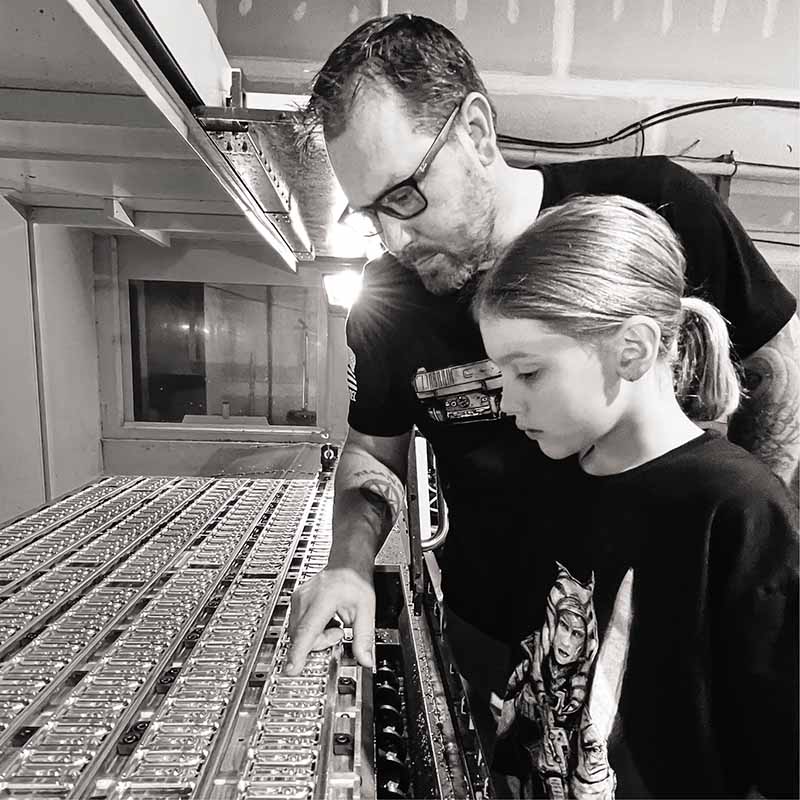
There’s an old Latin proverb that goes: Fortune favors the bold. Reduced to practically nothing after separating from his wife, Buck Holly did what he has always done: he went confidently in the direction of his dreams. He worked hard. He spent quality time with his daughter. And he never gave up. In the span of a couple years, he literally sold America on the idea of putting red dot sights on pistols – sights held in place by a single after-market plate he designed, improved, and patented in his little shop on Edsel Drive.
Today, GLOCK manufacturing predicts that nearly every new pistol will one day be fitted with a red dot optic and one of Holly’s plates. And there are millions of pistols sold in the United States every year.
“In the past three years, our company has seen a growth rate of 3,400 percent. And what’s really exciting is that we’re just now getting started. After finally making it to the top, the journey is really just beginning.”
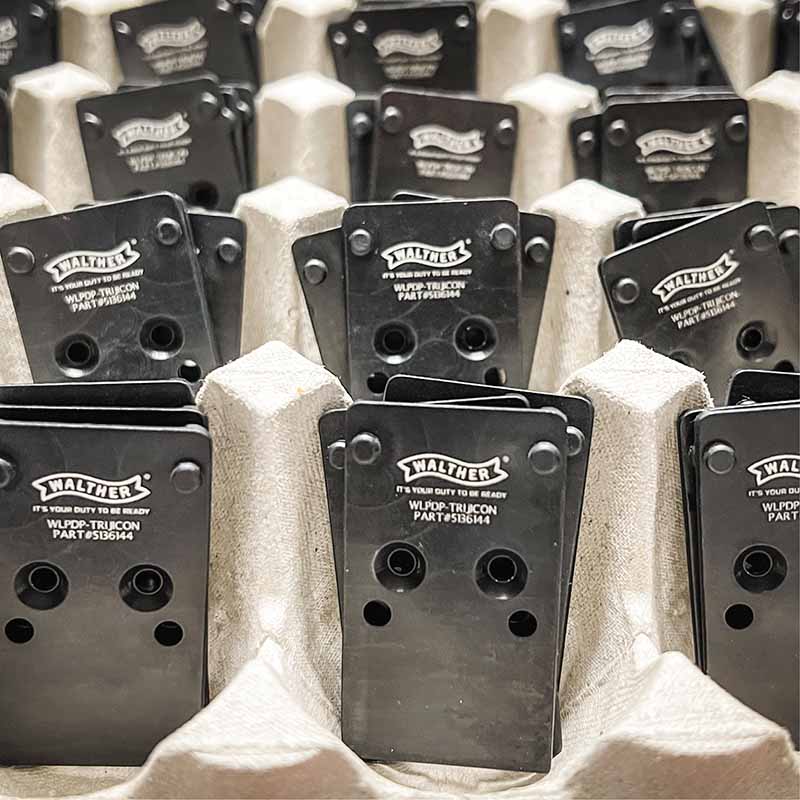
As the owls hoot outside his beautiful new home and the live oaks rustle in the breeze, Buck Holly is learning how to sleep again. But he’ll always miss the hum of the machines running late into the night – a comforting sound of hope and new possibilities. Fortune does indeed favor the bold. And Richmond Hill’s newest success story is just getting started.












